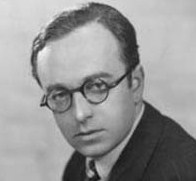Adrian Brunel
| Adrian Brunel | |
|---|---|
 |
|
| Born |
4 September 1892 Brighton, Sussex, England |
| Died | 18 February 1958 (aged 65) Gerrards Cross, Buckinghamshire, England |
| Occupation | Film director |
| Years active | 1917–1940 |
Adrian Brunel (4 September 1892 – 18 February 1958) was an English film director and screenwriter. Brunel's directorial career started in the silent era, and reached its peak in the latter half of the 1920s. His surviving work from the 1920s, both full-length feature films and shorts, is highly regarded by silent film historians for its distinctive innovation, sophistication and wit. With the arrival of talkies, Brunel's career ground to a halt and he was absent from the screen for several years before returning in the mid-1930s with a flurry of quota quickie productions, a majority of which are now classed as lost. Brunel's last credit as director was in a 1940 wartime propaganda short film, although he worked for a few years more as a "fixer-up" for films directed or produced by friends in the industry.
After decades of neglect, Brunel's work has latterly been rediscovered and has undergone a critical re-evaluation. His "lost" films are eagerly sought, and the British Film Institute includes two (The Crooked Billet (1929) and Badger's Green (1934)) on its "75 Most Wanted" list of missing British feature films.
Born in Brighton in 1892, Brunel was educated at Harrow School. His mother Adey was a drama teacher so he grew up in a stage milieu and dabbled in acting and writing plays, as well as training in opera. On leaving school he worked for a time as a local journalist in Brighton before taking employment in London in the bioscope show distribution division of music hall chain Moss Empires. This spurred his interest in cinema, and in 1916 he and a friend formed a company called Mirror Films, which produced one film, The Cost of a Kiss, the following year.
In 1920 Brunel joined with actor Leslie Howard and author A. A. Milne to set up Minerva Films, which produced six comedy shorts over a two-year period. Brunel's major break came in 1923, when he was offered the directorial role for the film The Man Without Desire, starring Ivor Novello. His feature film debut was a time-travelling story set in Venice and included location filming in the Italian city. Studio and post-production work took place in Germany, and the resulting work has been described as "one of the stranger films to emerge from Britain in the 1920s".
...
Wikipedia
